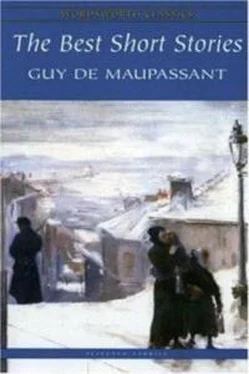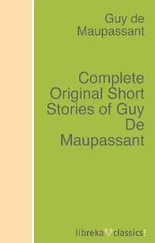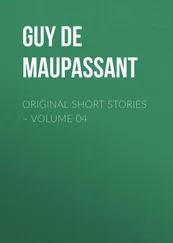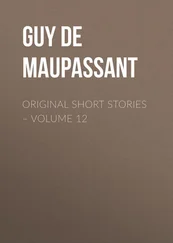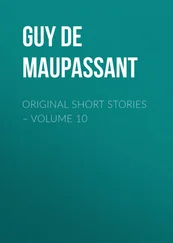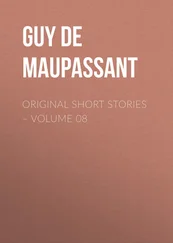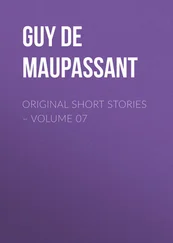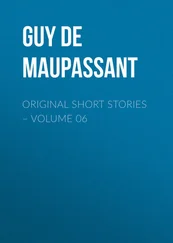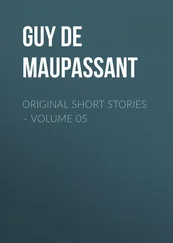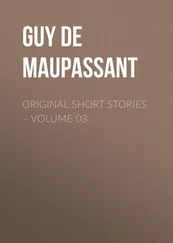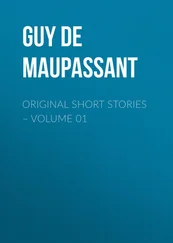The funeral took place next morning. Then, after the ceremony, the father–in–law and the daughter–in–law found themselves alone in the farmhouse with the child.
It was the usual dinner hour. She lighted the fire, made some soup and placed the plates on the table, while the old man sat on the chair waiting without appearing to look at her. When the meal was ready she bawled in his ear—
"Come, daddy, you must eat." He rose up, took his seat at the end of the table, emptied his soup bowl, masticated his bread and butter, drank his two glasses of cider and then took himself off.
It was one of those warm days, one of those enjoyable days when life ferments, pulsates, blooms all over the surface of the soil.
Old Amable pursued a little path across the fields. He looked at the young wheat and the young oats, thinking that his son was now under the earth, his poor boy! He walked along wearily, dragging his legs after him in a limping fashion. And, as he was all alone in the plain, all alone under the blue sky, in the midst of the growing crops, all alone with the larks which he saw hovering above his head, without hearing their light song, he began to weep as he proceeded on his way.
Then he sat down beside a pond and remained there till evening, gazing at the little birds that came there to drink. Then, as the night was falling, he returned to the house, supped without saying a word and climbed up to his loft. And his life went on as in the past. Nothing was changed, except that his son Cesaire slept in the cemetery.
What could he, an old man, do? He could work no longer; he was now good for nothing except to swallow the soup prepared by his daughter–in–law. And he ate it in silence, morning and evening, watching with an eye of rage the little boy also taking soup, right opposite him, at the other side of the table. Then he would go out, prowl about the fields after the fashion of a vagabond, hiding behind the barns where he would sleep for an hour or two as if he were afraid of being seen and then come back at the approach of night.
But Celeste's mind began to be occupied by graver anxieties. The farm needed a man to look after it and cultivate it. Somebody should be there always to go through the fields, not a mere hired laborer, but a regular farmer, a master who understood the business and would take an interest in the farm. A lone woman could not manage the farming, watch the price of corn and direct the sale and purchase of cattle. Then ideas came into her head, simple practical ideas, which she had turned over in her head at night. She could not marry again before the end of the year, and it was necessary at once to take care of pressing interests, immediate interests.
Only one man could help her out of her difficulties, Victor Lecoq, the father of her child. He was strong and understood farming; with a little money in his pocket he would make an excellent cultivator. She was aware of his skill, having known him while he was working on her parents' farm.
So one morning, seeing him passing along the road with a cart of manure, she went out to meet him. When he perceived her, he drew up his horses and she said to him as if she had met him the night before:
"Good–morrow, Victor—are you quite well, the same as ever?"
He replied:
"I'm quite well, the same as ever—and how are you?"
"Oh, I'd be all right, only that I'm alone in the house, which bothers me on account of the farm."
Then they remained chatting for a long time, leaning against the wheel of the heavy cart. The man every now and then lifted up his cap to scratch his forehead and began thinking, while she, with flushed cheeks, went on talking warmly, told him about her views, her plans; her projects for the future. At last he said in a low tone:
"Yes, it can be done."
She opened her hand like a countryman clinching a bargain and asked:
"Is it agreed?"
He pressed her outstretched hand.
"'Tis agreed."
"It's settled, then, for next Sunday?"
"It's settled for next Sunday"
"Well, good–morning, Victor."
"Good–morning, Madame Houlbreque."
Part III:
This particular Sunday was the day of the village festival, the annual festival in honor of the patron saint, which in Normandy is called the assembly.
For the last eight days quaint–looking vehicles in which live the families of strolling fair exhibitors, lottery managers, keepers of shooting galleries and other forms of amusement or exhibitors of curiosities whom the peasants call "wonder–makers" could be seen coming along the roads drawn slowly by gray or sorrel horses.
The dirty wagons with their floating curtains, accompanied by a melancholy–looking dog, who trotted, with his head down, between the wheels, drew up one after the other on the green in front of the town hall. Then a tent was erected in front of each ambulant abode, and inside this tent could be seen, through the holes in the canvas, glittering things which excited the envy or the curiosity of the village youngsters.
As soon as the morning of the fete arrived all the booths were opened, displaying their splendors of glass or porcelain, and the peasants on their way to mass looked with genuine satisfaction at these modest shops which they saw again, nevertheless, each succeeding year.
Early in the afternoon there was a crowd on the green. From every neighboring village the farmers arrived, shaken along with their wives and children in the two–wheeled open chars–a–bancs, which rattled along, swaying like cradles. They unharnessed at their friends' houses and the farmyards were filled with strange–looking traps, gray, high, lean, crooked, like long–clawed creatures from the depths of the sea. And each family, with the youngsters in front and the grown–up ones behind, came to the assembly with tranquil steps, smiling countenances and open hands, big hands, red and bony, accustomed to work and apparently tired of their temporary rest.
A clown was blowing a trumpet. The barrel–organ accompanying the carrousel sent through the air its shrill jerky notes. The lottery–wheel made a whirring sound like that of cloth tearing, and every moment the crack of the rifle could be heard. And the slow–moving throng passed on quietly in front of the booths resembling paste in a fluid condition, with the motions of a flock of sheep and the awkwardness of heavy animals who had escaped by chance.
The girls, holding one another's arms in groups of six or eight, were singing; the youths followed them, making jokes, with their caps over their ears and their blouses stiffened with starch, swollen out like blue balloons.
The whole countryside was there—masters, laboring men and women servants.
Old Amable himself, wearing his old–fashioned green frock coat, had wished to see the assembly, for he never failed to attend on such an occasion.
He looked at the lotteries, stopped in front of the shooting galleries to criticize the shots and interested himself specially in a very simple game which consisted in throwing a big wooden ball into the open mouth of a mannikin carved and painted on a board.
Suddenly he felt a tap on his shoulder. It was Daddy Malivoire, who exclaimed:
"Ha, daddy! Come and have a glass of brandy."
And they sat down at the table of an open–air restaurant.
They drank one glass of brandy, then two, then three, and old Amable once more began wandering through the assembly. His thoughts became slightly confused, he smiled without knowing why, he smiled in front of the lotteries, in front of the wooden horses and especially in front of the killing game. He remained there a long time, filled with delight, when he saw a holiday–maker knocking down the gendarme or the cure, two authorities whom he instinctively distrusted. Then he went back to the inn and drank a glass of cider to cool himself. It was late, night came on. A neighbor came to warn him:
Читать дальше
